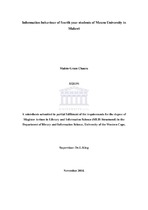Information behaviour of fourth year students of Mzuzu University in Malawi
Abstract
The study investigated the information behaviour of fourth year students of Mzuzu University in Malawi. The study specifically intended to establish the information needs, preferred information sources and information seeking behaviours of fourth year students at Mzuzu University. The study also aimed at ascertaining whether emotions experienced by these students conformed to some of those identified by Kuhlthau’s Information Search Process (ISP) model. The study used the Kuhlthau’s Information Search Process model as a theoretical framework because of its being closer to reality on how students search for information. The target population of the study was seven hundred and fifty two (752) fourth year students belonging to the five faculties of the University (Mzuzu University website, 2013). A mixed method survey employing both qualitative and quantitative approaches was used. The study used the probability sampling method. Specifically, stratified sampling in which students were divided into different strata according to the faculty they belong to was adopted. The study used the sample size of two hundred and fifty four (254) students of which two hundred and forty three (243) responded to the questionnaire. The results of the study revealed that most of the fourth year students (65.4%) needed information for their academic studies. The study also found that most of these students (62.5%) preferred electronic and not printed information sources. Most students indicated that they did not use e-journals (66%), subscription databases (94%) or printed journals (52%). As sources of information, students relied mainly on the Internet (64.6%), search engines like Google (56.2%) and the OPAC (45%). When searching for information, the majority of students did not use truncation (98.3%) or Boolean logic (98.8%).It has also been established that students did not fully conform to Kuhlthau’s ISP model of information behaviour. Some of the obstacles met during information seeking were lack of financial resources as well as lack of essential textbooks and important books. The findings suggest that the students lack information literacy skills and it is recommended that the university should re-examine its information literacy education. It is expected that the findings of this study will assist the researcher and the Mzuzu University library and the Learning Resources Centre to establish more effective and user centred services to meet the needs of their students. It also adds to the body of knowledge on information behaviour of students, especially in Malawi.

